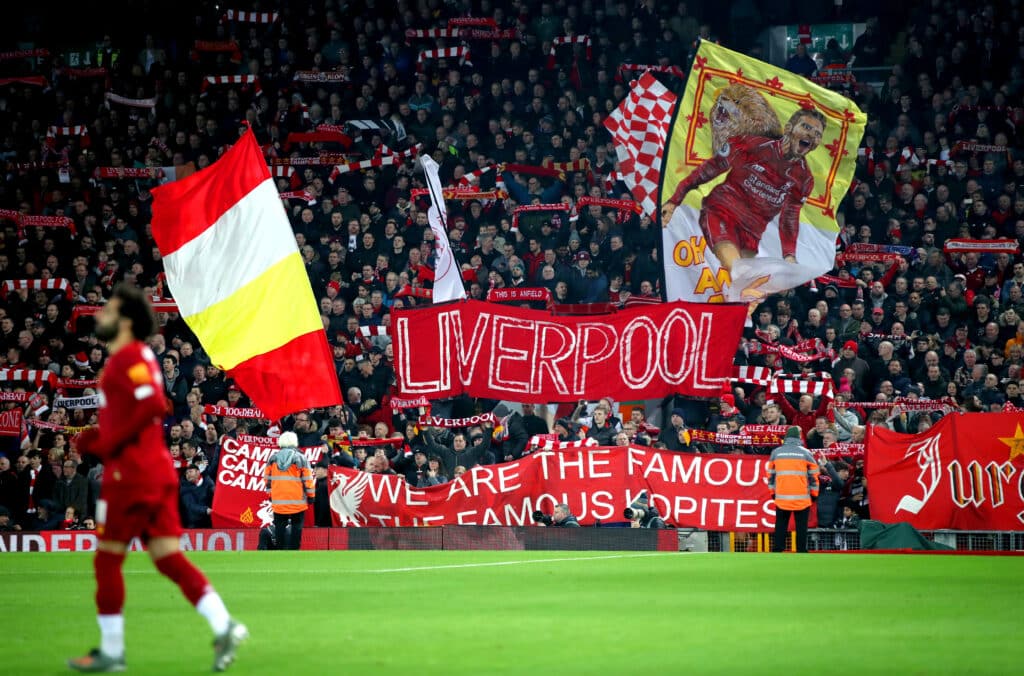Premier League games played abroad: Is it time for English football to follow the NFL’s lead?

This weekend, at the same time as Aston Villa take on Manchester United in a blockbuster Premier League clash, another massive ‘football’ match will be taking place at the same time further south. At 14:30, London will once again be playing host to one of American sports’ biggest exports: the NFL. The New York Jets and Minnesota Vikings are set to battle it out at Tottenham Hotspur Stadium, continuing the NFL’s long-running tradition of staging regular-season games in the UK.
The event is sure to draw thousands of eager fans to the stadium, with millions more tuning in from all over the world. But as American football’s biggest stars warm up for this international spectacle, it begs the question: should the Premier League be doing the same?
The notion of the Premier League taking competitive matches abroad isn’t exactly new. The infamous “Game 39” proposal first floated in 2008 suggested that an extra round of fixtures could be played at international venues. Though the idea was ultimately shelved due to fan backlash, it’s never fully disappeared from the conversation. With football’s global appeal growing exponentially, and American sports leagues successfully expanding their reach beyond national borders, could the time be ripe for the Premier League to embrace the same?
Should the Premier League go global?
The Case For Taking the Premier League Global
1. Financial Benefits
One of the most compelling reasons for the Premier League to host matches abroad is the significant financial windfall it could bring. The NFL’s International Series is a prime example of how playing games in foreign markets can boost revenue. In 2023, each NFL team reportedly made $1 million by giving up a home game to play in London, and ticket sales in the UK have been astronomical.
Fans flock to the games, often paying high prices for the opportunity to see live American football on their doorstep. In fact, I myself will be one of those fans, flocking to the Spurs stadium on Sunday with the dream of seeing Aaron Rodgers throw a touchdown in my home city. I wonder how many Americans have had that same dream about Erling Haaland scoring a goal in their hometown. Many, I imagine.

The Premier League could see similar success. As the most popular football league globally, it boasts a massive international following. An estimated 1.87 billion people worldwide follow the Premier League, and these fans are hungry for more than just TV broadcasts. Holding Premier League matches in North America, Asia, or the Middle East could not only sell out stadiums but also create new commercial opportunities. From merchandise sales to sponsorship deals, the financial rewards could be substantial.
2. Expanding the Fanbase
While English clubs have long been popular outside of the UK, staging matches abroad could solidify their presence in new markets. The Premier League already broadcasts games in 189 nations, with North America accounting for 35% of international broadcasts. In the United States, soccer has surged in popularity in recent years, even overtaking ice hockey as the fourth-most-watched sport. The Premier League is already vying for dominance over Major League Soccer (MLS), and bringing competitive games stateside could help solidify its standing as the top soccer league in the country.

But the growth isn’t just limited to the US. The Middle East and Asia have also shown significant interest in European football, with leagues like Serie A and La Liga already considering the possibility of overseas games. For the Premier League, playing games in key markets like China or Saudi Arabia would be a direct way to engage these fans and develop long-lasting relationships with new supporters.
@FCBayernEN will play @realmadriden in MetLife Stadium, New Jersey, U.S.. For more info: https://t.co/AXeLuUXQIa pic.twitter.com/cxZ2T6OcX2
— 365Scores (@365Scores) August 3, 2016
3. Following the NFL’s Model
The NFL’s success with international games isn’t an isolated case. The league has expanded its regular-season offerings to include games in Mexico, Germany, and even Brazil. In 2024, the NFL will add Spain to the growing list of host nations. These efforts have brought American football closer to its international fanbase while also creating a sense of exclusivity and excitement around these marquee events.

If the Premier League can replicate this model, the potential for growth is vast. International matches could become major events, attracting fans from all over the world. They could also serve as a promotional tool for clubs, allowing them to build brand loyalty and increase their international visibility.
The Case Against Playing Premier League Matches Abroad
1. Fan Backlash and the Tradition of English Football
Despite the financial appeal, taking Premier League matches abroad could seriously damage the league’s relationship with its most important stakeholders: the fans. English football culture is deeply rooted in tradition, and for many supporters, the idea of moving games outside of England feels like a betrayal. Fans invest emotionally and financially in following their teams week in and week out, and removing a home game could be seen as prioritizing international markets over local supporters.
When “Game 39” was first proposed, it was met with widespread outrage. Fan organizations, club managers, and even former FIFA president Sepp Blatter voiced opposition to the idea, with many seeing it as a cash grab at the expense of football’s competitive integrity. Critics argued that playing matches abroad would disrupt the fairness of the league by altering the traditional home-and-away format.

More recently, similar backlash erupted when Liverpool‘s American chairman, Tom Werner, floated the idea of hosting Premier League matches in New York. Liverpool’s supporters’ group, Spirit of Shankly, vehemently opposed the idea, stating that football’s issues lie elsewhere, such as in ticket prices and financial fairness, not in where games are played.
2. Disrupting Competitive Integrity
One of the biggest criticisms of playing Premier League matches abroad is the potential impact on competitive balance. In the current format, each team plays 19 home games and 19 away games, creating an equal playing field for all clubs. Moving a home fixture abroad would effectively deny teams their home advantage, which could have a significant impact on their season.
Home advantage in football is not just about familiar surroundings—it’s also about the fans. The roar of the crowd, the chants, and the energy that comes from playing in front of a passionate home support can often make the difference between winning and losing. By taking a game abroad, teams would lose this advantage, and the integrity of the competition could be called into question.
Moreover, not every team has the same global appeal. While clubs like Manchester United, Liverpool, and Chelsea might draw huge crowds in the US or Asia, smaller teams may struggle to fill stadiums abroad. This imbalance could further skew the competition in favor of the larger, more popular clubs.
3. Player Welfare and Fixture Congestion
Another concern with taking Premier League matches abroad is the potential strain it could place on players. The football calendar is already packed, with domestic leagues, cup competitions, and international fixtures leaving little room for rest. Adding long-haul travel into the mix could exacerbate the issue, increasing the risk of injuries and player burnout.
Premier League Chief Executive Richard Masters has been vocal about his concerns regarding FIFA’s expansion of tournaments like the Club World Cup, citing player welfare as a major issue. Masters argued that clubs and players need sufficient rest between seasons, and adding more international travel would make it harder to ensure this.
Rodri, Manchester City star, has also voiced concerns about the number of matches played already. Shortly after he publically expressed himself, he tore his ACL against Arsenal. An increase to the amount of games per season could see star players consistently miss out through injury.

There’s also the risk that playing matches abroad could lead to fixture congestion. If Premier League games are moved to other countries, teams may have to adjust their schedules to accommodate travel, potentially disrupting the flow of the season.
Jurrien Timber backs Rodri over 'intense schedule' claims pic.twitter.com/GCgI3Cm3Vy
— 365Scores (@365Scores) October 1, 2024
Is It Worth the Risk?
The question of whether the Premier League should take matches abroad is complex, with valid arguments on both sides. On one hand, the financial benefits and potential for global growth are undeniable. The league could strengthen its position as the world’s most popular football competition and create exciting new opportunities for fans around the globe to experience the magic of the Premier League firsthand.
Ready for some London @NFL action? Our @arwootton is at the stadium providing coverage and providing a breakdown of all the action.
— 365Scores (@365Scores) October 2, 2022
Be sure to follow Anthony and check out his picks and predictions for today!#NFL #GamblingTwitter pic.twitter.com/Lps081zJa1
On the other hand, playing matches abroad comes with significant risks. Fan backlash, concerns over competitive integrity, and the potential impact on player welfare are all major hurdles that need to be addressed. For many English fans, the heart of football lies in the local community, and taking games away from that could alienate the very people who have supported the league for decades.
Ultimately, the Premier League must carefully weigh the benefits of global expansion against the potential costs. If it can find a way to strike a balance—perhaps by limiting the number of games played abroad or ensuring that fan consultation is a priority—then the idea may gain more traction in the years to come. For now, though, the league remains firmly rooted in England, with international tours reserved for pre-season warmups.
But as the NFL continues to thrive on the global stage, it’s clear that the pressure is mounting. The Premier League may soon find itself facing a critical decision: stay local, or take the show on the road. Only time will tell which path it chooses.
By Nicky Helfgott – NickyHelfgott1 on X (Twitter)
Keep up with all the latest football news and Premier League news on 365Scores!



